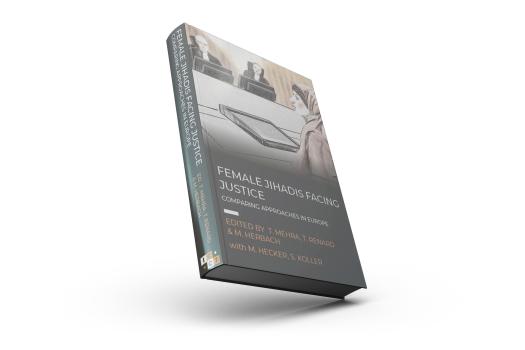Several European countries have actively or on a case-by-case basis started to repatriate women and their children, resulting in specific challenges to the various actors managing them throughout the criminal justice chain. So far limited evidence-based analysis is available due to the small number of cases. However, with several hundred European women still present in the Kurdish administered camps in Northeastern Syria, this topic will also likely be staying on the political agenda for the coming years as countries are repatriating women from their camps on a case-by-case basis or as policy.
This project, funded by the Dutch National Coordinator for Security and Counter-Terrorism (NCTV), both informs practitioners and policymakers in Belgium, France, Germany, and the Netherlands, and formulate recommendations for them.
ICCT experts gathered insights on challenges at each stage of the journey of female returnees and VEOs through the criminal justice system, drawing on open-source research and interviews with selected national stakeholders. ICCT appraised practitioners and policymakers involved in their prosecution, prison management, rehabilitation, and reintegration of existing approaches and (gender-sensitive) needs and gaps, as well as formulate policy recommendations.
The findings will be used to assist policymakers with developing a rule of law compliant criminal justice response, where applicable, and provide effective rehabilitation and reintegration efforts for female returnees and violent extremist offenders (VEOs).
Highlights
About the project
Repatriation of European women and their children from Northeastern Syria remains a live policy issue. Approaches diverge, and more evidence-based analysis is required, so as to support rule-of-law and effective criminal justice response. More broadly, there is a need to reflect on the prosecution, management and rehabilitation of female VEOs, and study in more details what gender-specific risks and needs they pose in the broader context of an increasing number of women involved in terrorist activities (of all forms). Consulted stakeholders have expressed the need for conducting deeper analysis and formulating recommendations for practice and policy.
The general objectives of this project, funded by the Dutch National Coordinator for Security and Counterterrorism, were two-fold. First, it was to inform practitioners and policy makers involved in prosecution, prison management, rehabilitation, and reintegration of returning female returnees and VEOs of existing approaches and identified needs or gaps in Belgium, France, Germany, and the Netherlands. Second, this project was to formulate recommendations for a more evidence-based and rule-of-law compliant approach.
Building on insights resulting from interviews with 69 relevant practitioners and policy makers, as well as on the analysis of court decisions for 277 female VEOs, the project team authored an unique data-driven comparative study which provides a contemporary overview of the various profiles and roles of these women. This book, Female Jihadis Facing Justice: Comparing Approaches in Europe, further provides an in-depth assessment of the applicable frameworks and practices in Europe relating to the management of female VEOs in the criminal justice system, covering prosecution, prison management, rehabilitation, and reintegration. Drawing from this, ICCT experts formulated concrete policy recommendations. The findings were presented in a a closed-door workshop with representatives from each country, as well as a live briefing that raised awareness among an audience of policymakers, practitioners, academics, and students.
These efforts will assist policymakers with developing an evidence-based, rule of law compliant criminal justice response. In the long-term, this in turn will:
- Contribute to accountability for the full range of crimes that have been committed by female returnees and VEOs;
- Improve gender-sensitive prison management, and mitigate the risk of recidivism;
- Enhance effective rehabilitation and reintegration for female returnees and VEOs.








